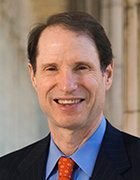
agsandrew - Fotolia
FBI encryption argument draws fire from senator
Sen. Ron Wyden challenged the FBI encryption argument and asked the FBI director to be transparent about claims that lawful access could be provided securely.
The new FBI director has taken the same stance on encryption as the last. And, now, a U.S. senator is asking for proof behind FBI claims that secure lawful access is possible.
FBI Director Christopher Wray spoke publicly about encryption at Fordham University on Jan. 9, 2018, where he repeated the long-standing FBI encryption argument that security and lawful access shouldn't be mutually exclusive. On Thursday, Sen. Ron Wyden (D-Ore.) wrote a letter to Wray expressing disappointment that Wray made public comments on the FBI's encryption stance without first discussing it with Wyden.
Wray claimed he didn't want an FBI encryption "backdoor," but Wyden noted that not using the term backdoor doesn't change the underlying issues.
"Regardless of whether the Federal Bureau of Investigation labels vulnerability by design a backdoor, a front door, or a 'secure golden key,' it is a flawed policy that would harm American security, liberty, and our economy," Wyden wrote in the letter. "Your stated position parrots the same debunked arguments espoused by your predecessors, all of whom ignored the widespread and vocal consensus of cryptographers. For years, these experts have repeatedly stated that what you are asking for is not, in fact, possible."
Wyden closed his letter with a challenge to Wray to prove the FBI encryption argument transparently by providing "a list of the cryptographers" with whom Wray spoke and to "specifically identify those experts who advised you that companies can feasibly design government access features into their products without weakening cybersecurity."
Wyden has long been a defender of strong encryption and had questioned former FBI Director James Comey in mid-2015 during the early FBI encryption debate related to iPhone access. At the time, Wyden asked Comey if he would be able to guarantee encryption keys needed for lawful access would never be stolen, to which Comey replied, "Surely not."
Across the pond
 Sen. Ron Wyden (D-Ore.)
Sen. Ron Wyden (D-Ore.)
One day after Wyden asked for more transparency behind the FBI encryption argument, British Prime Minister Theresa May voiced support for encryption backdoors at the World Economic Forum in Davos, Switzerland. May argued that because tech "companies have some of the best brains in the world," a solution to secure encryption access must be possible, despite those "best brains" saying for decades that it is not.
May even attempted some fearmongering to drum up support for encryption backdoors.
"And just as these big companies need to step up, so we also need cross-industry responses, because smaller platforms can quickly become home to criminals and terrorists. We have seen that happen with Telegram. And we need to see more cooperation from smaller platforms like this," May said. "No one wants to be known as 'the terrorists' platform' or the first choice app for pedophiles."
John Martin, product manager for SentryOne, based in Huntersville, N.C., suggested on Twitter that May should listen to experts before making more public comments.
"Politicians need to take their responsibilities to society seriously and respect the rights of the people. You want a backdoor into encryption that only law enforcement can use. Not possible, it is fundamental mathematics preventing it, not tech companies being awkward," Martin wrote. "How can you say this and at the same time espouse the weakening of encryption? You really need to pay attention to advisors who know what they are talking about or get better ones. Quit with the soundbites and actually listen to experts for once."







